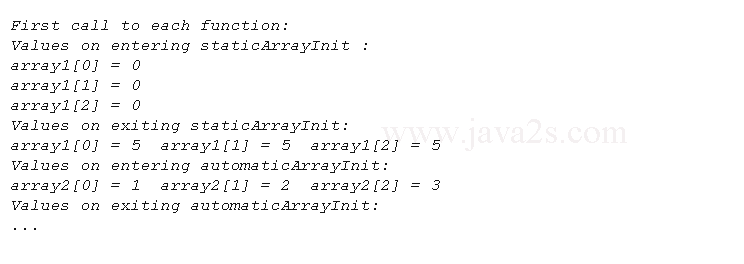Static arrays are initialized to zero. - C++ Data Type
C++ examples for Data Type:Array
Description
Static arrays are initialized to zero.
Demo Code
#include <iostream> using namespace std; void staticArrayInit( void ); // function prototype void automaticArrayInit( void ); // function prototype const int arraySize = 3; int main() /*from w ww .ja v a2s . c om*/ { cout << "First call to each function:\n"; staticArrayInit(); automaticArrayInit(); cout << "\n\nSecond call to each function:\n"; staticArrayInit(); automaticArrayInit(); cout << endl; } void staticArrayInit( void ) { // initializes elements to 0 first time function is called static int array1[ arraySize ]; // static local array cout << "\nValues on entering staticArrayInit :\n"; for ( int i = 0; i < arraySize; ++i ) cout << "array1[" << i << "] = " << array1[ i ] << "\n"; cout << "\nValues on exiting staticArrayInit:\n" ; // modify and output contents of array1 for ( int j = 0; j < arraySize; ++j ) cout << "array1[" << j << "] = " << ( array1[ j ] += 5 ) << " "; } // function to demonstrate an automatic local array void automaticArrayInit( void ) { // initializes elements each time function is called int array2[ arraySize ] = { 1, 2, 3 }; // automatic local array cout << "\n\nValues on entering automaticArrayInit:\n"; // output contents of array2 for ( int i = 0; i < arraySize; ++i ) cout << "array2[" << i << "] = " << array2[ i ] << " "; cout << "\nValues on exiting automaticArrayInit:\n"; // modify and output contents of array2 for ( int j = 0; j < arraySize; ++j ) cout << "array2[" << j << "] = " << ( array2[ j ] += 5 ) << " "; }
Result
